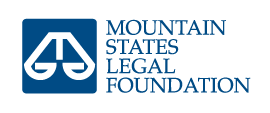|
 |
Contact: William Perry Pendley 303/292-2021, Ext. 30 |
Supreme Court Slaps Down EPA’s Green-House Gas Rules
June 23, 2014 – DENVER, CO. The Supreme Court of the United States today sharply limited the authority of the Environmental Protection Agency’s (EPA) to regulate greenhouse gases (GHG) to address so-called climate change. Consistent with a friend of the court brief filed by Mountain States Legal Foundation (MSLF), the Court held that the Clean Air Act does not compel the EPA to regulate GHG from stationary sources and that the EPA lacked discretion to modify the terms of the federal statute. The ruling reverses a decision by a three-judge panel of the U.S. Court of Appeals for the District of Columbia in favor of the EPA. In 2009, the EPA announced that it has 95% confidence that GHG emissions pose high risk of extreme harms to the American public; thereafter, the EPA issued rules that restrict GHG emissions. The panel held EPA’s actions were neither arbitrary nor capricious and its interpretation of federal law was correct. Two of the court’s appellate judges dissented strongly from the denial of en banc review.
“We are pleased with the Court’s 5-4 ruling limiting the EPA to the terms of federal statute and barring it from implementing a regulation that the EPA admits produces an absurd result, which was clearly unintended by Congress,” said William Perry Pendley, MSLF president.
In December 2009, the EPA issued a final rule (the Endangerment Rule) in which it found that greenhouse gases (GHG), which include carbon dioxide, methane, nitrous oxide, hydroflurocarbons, perfluorocarbons, and sulfur hexafluoride, endanger the health and welfare of the American people under Section 202(a) of the Clean Air Act (CAA). The EPA’s finding and rule, if permitted to stand, allow the EPA to use the CAA to regulate GHG. The EPA’s new finding came following a 2007 U.S. Supreme Court decision that the EPA has authority to regulate GHG emissions using the CAA.
In December 2009, and subsequently, several entities petitioned for review changing the Endangerment Rule. A host of state governments and environmental groups intervened as respondents, and numerous state governments, trade associations, and chambers of commerce intervened as petitioners. In February 2010, the cases were consolidated and MSLF sought and won the right to participate in the matter as an amicus curiae.
Meanwhile, various entities petitioned the EPA to reconsider its Endangerment Rule given new evidence as to the validity of its findings. In August 2010, the EPA denied those petitions. New petitions for review of the EPA’s latest decision were filed and consolidated with the other petitions.
In April 2013, nine separate petitions for writ of certiorari were filed; in October 2013, the Supreme Court granted six petitions.
Mountain States Legal Foundation, created in 1977, is a nonprofit, public-interest legal foundation dedicated to individual liberty, the right to own and use property, limited and ethical government, and the free enterprise system. Its offices are in suburban Denver, Colorado.
Diane L. Patrick
Assistant to the President
MOUNTAIN STATES LEGAL FOUNDATION
2596 S. Lewis Way
Lakewood, CO 80227
303/292-2021, Ext. 27
mountainstateslegal.org
Mountain States Legal Foundation, founded in 1977, is a nonprofit, public-interest legal foundation dedicated to individual liberty, the right to own and use property, limited and ethical government, and the free enterprise system. Its offices are in suburban Denver, Colorado.
